 I’m sitting with my laptop across my lap in the back of the exquisite Great Hall in the old and wonderful downtown Lancaster Trust Performing Arts Center, an old downtown bank repurposed wonderfully for the common good of the city by Lancaster Bible College. We have sold books there before and have heard concerts (including a memorable evening with Bill Mallonee) and lectures (from Esther Meek on epistemology to Wes Hill on friendship to Mako Fujimura on artful culture care) Folks here at the annual Square Halo conference are now filtering in from other workshops, conversations, art-making experiences. I did a well-received talk on why reading widely is important for Christian living and it was good to be preaching to the choir. In many ways, the creative folks gathered at this event — inspired by the hospitable, lovely, thoughtful grace of the late Leslie Bustard who helped run the show before her death not even a year ago — is my tribe. Beth was herself out of town, but she, too, would have loved this energetic coalition of various ages, denominations, and styles, from the most hipster young artists to buttoned down conservative clergy to graying old hippies, all united around a generous orthodoxy of faith (what a delight to know there were Catholic deacons and priests, Mennonites of various sorts, high church Anglicans and low church charismatics, local Methodists and Baptists from other states, with Reformed folks of all stripes from within the alphabet soup of Presbyterianism) gladly side by side wondering how to nurture and live out a sense, as the conference theme has it, of “creativity, collaboration, and community.”
I’m sitting with my laptop across my lap in the back of the exquisite Great Hall in the old and wonderful downtown Lancaster Trust Performing Arts Center, an old downtown bank repurposed wonderfully for the common good of the city by Lancaster Bible College. We have sold books there before and have heard concerts (including a memorable evening with Bill Mallonee) and lectures (from Esther Meek on epistemology to Wes Hill on friendship to Mako Fujimura on artful culture care) Folks here at the annual Square Halo conference are now filtering in from other workshops, conversations, art-making experiences. I did a well-received talk on why reading widely is important for Christian living and it was good to be preaching to the choir. In many ways, the creative folks gathered at this event — inspired by the hospitable, lovely, thoughtful grace of the late Leslie Bustard who helped run the show before her death not even a year ago — is my tribe. Beth was herself out of town, but she, too, would have loved this energetic coalition of various ages, denominations, and styles, from the most hipster young artists to buttoned down conservative clergy to graying old hippies, all united around a generous orthodoxy of faith (what a delight to know there were Catholic deacons and priests, Mennonites of various sorts, high church Anglicans and low church charismatics, local Methodists and Baptists from other states, with Reformed folks of all stripes from within the alphabet soup of Presbyterianism) gladly side by side wondering how to nurture and live out a sense, as the conference theme has it, of “creativity, collaboration, and community.”
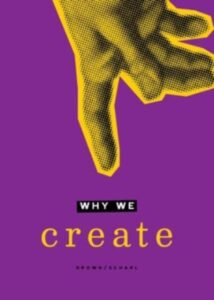 There were a few workshops recorded live for podcasts (including one with Square Halo Books creative director Ned Bustard in conversation with North Carolinian Stephen Roach (author of the very nice Naming the Animals) and Coloradan Brian Brown (leader of the thoughtful Anselm Society and author of the excellent collection Why We Create.) There was a (nearly) graduate level seminar on C.S. Lewis as reader and writer by Corey Latta (author of C. S. Lewis and the Art of Writing: What the Essayist, Poet, Novelist, Literary Critic, Apologist, Memoirist, Theologian Teaches Us about the Life and Craft of Writing) and a delightfully inspired presentation by a New York City kindergarten teacher offering innovative picture books that could be used to enliven the imaginations of little ones and even community something about the mystery of the Holy Spirit. Did I mention I think this was surely my tribe, creative folks who care about the world, who gather in both joy and lament? You should come to next year’s Square Halo event!
There were a few workshops recorded live for podcasts (including one with Square Halo Books creative director Ned Bustard in conversation with North Carolinian Stephen Roach (author of the very nice Naming the Animals) and Coloradan Brian Brown (leader of the thoughtful Anselm Society and author of the excellent collection Why We Create.) There was a (nearly) graduate level seminar on C.S. Lewis as reader and writer by Corey Latta (author of C. S. Lewis and the Art of Writing: What the Essayist, Poet, Novelist, Literary Critic, Apologist, Memoirist, Theologian Teaches Us about the Life and Craft of Writing) and a delightfully inspired presentation by a New York City kindergarten teacher offering innovative picture books that could be used to enliven the imaginations of little ones and even community something about the mystery of the Holy Spirit. Did I mention I think this was surely my tribe, creative folks who care about the world, who gather in both joy and lament? You should come to next year’s Square Halo event!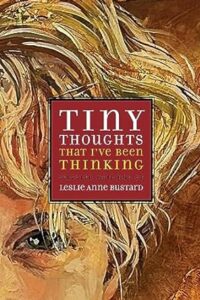 The newly released volume of Leslie’s poetry, essays, and CaringBridge pieces, Tiny Thoughts That I’ve Been Thinking was popular there and there was a workshop presented by friends and family to help folks engage with some of her “tiny thoughts.” (I couldn’t bear to attend it, thinking I would just weep through it all, so I missed it, but I share with you now that Leslie was honored well by her colleagues curating such a fine event.)
The newly released volume of Leslie’s poetry, essays, and CaringBridge pieces, Tiny Thoughts That I’ve Been Thinking was popular there and there was a workshop presented by friends and family to help folks engage with some of her “tiny thoughts.” (I couldn’t bear to attend it, thinking I would just weep through it all, so I missed it, but I share with you now that Leslie was honored well by her colleagues curating such a fine event.)  Seeing the Holy Spirit in Narnia in the previous BookNotes announcing how really is good it is and how it should be greatly appreciated by the vast network of Lewis scholars, institutes, centers, reading groups. Spread the word about this new one — there is nothing like it.
Seeing the Holy Spirit in Narnia in the previous BookNotes announcing how really is good it is and how it should be greatly appreciated by the vast network of Lewis scholars, institutes, centers, reading groups. Spread the word about this new one — there is nothing like it.And what a delight to hang out with so many interesting people — from Tom Becker who hosts the extraordinary Row House conversations in Lancaster (and wrote about his approach in Good Posture, a book we often recommend) to Matt Wheeler who has a CD inspired by the short stories of Wendell Berry to long-time H&M supporter Chris MacIntosh (who has the longest running rock radio show in America, out of a college station in New York, where he plays the very best of hard-to-find, artfully crafted, indie Christian rock) to many of the 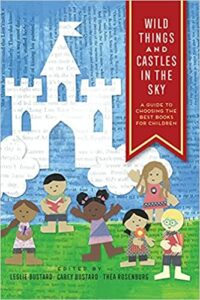
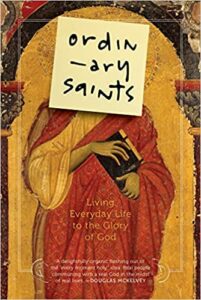 contributors to some of our favorite Square Halo anthologies, like the fabulous one about kid’s books (Wild Things and Castles in the Sky: A Guide to Choosing the Best Books for
contributors to some of our favorite Square Halo anthologies, like the fabulous one about kid’s books (Wild Things and Castles in the Sky: A Guide to Choosing the Best Books for 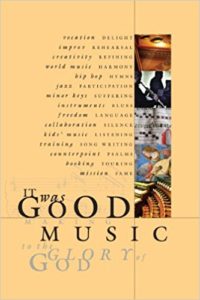 Children) or Ordinary Saints: Living Everyday Life to the Glory of God (where
Children) or Ordinary Saints: Living Everyday Life to the Glory of God (where 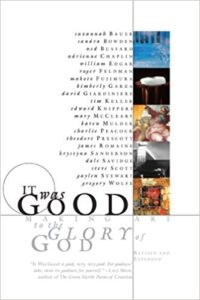 I have a chapter, by the way) or finding those who contributed to the fabulous It Was Good Making Art to the Glory of God and It Was Good: Making Music to the Glory of God. To connect faces and stories of people whose names we’ve seen in books is so nice. And — you know who you are — how rewarding and refreshing it was to catch up with old friends and valued customers.
I have a chapter, by the way) or finding those who contributed to the fabulous It Was Good Making Art to the Glory of God and It Was Good: Making Music to the Glory of God. To connect faces and stories of people whose names we’ve seen in books is so nice. And — you know who you are — how rewarding and refreshing it was to catch up with old friends and valued customers.
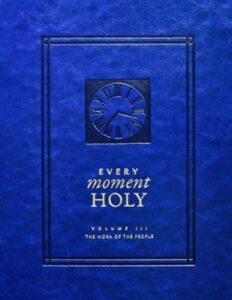 Something special sometimes happens when I’m up front, like when I was highlighting the marvelous third volume of the extraordinary Every Moment Holy liturgies/prayer books, by writer and editor Doug McKelvey, only to realize that he was in the room. He, too — along with circles of friends from places like Rabbit Room in Nashville or Laity Lodge in Texas or Jubilee in Pittsburgh — values the Square Halo team, both their publishing efforts and their conferences that offer theology and the arts and culture and friendship. And there he was.
Something special sometimes happens when I’m up front, like when I was highlighting the marvelous third volume of the extraordinary Every Moment Holy liturgies/prayer books, by writer and editor Doug McKelvey, only to realize that he was in the room. He, too — along with circles of friends from places like Rabbit Room in Nashville or Laity Lodge in Texas or Jubilee in Pittsburgh — values the Square Halo team, both their publishing efforts and their conferences that offer theology and the arts and culture and friendship. And there he was.
Thanks for allowing me to bring this little glimpse of at least one of the nodes of our networks that become our Hearts & Minds bookish ecosystem. You may not know or even care much about these sorts of events or this particular batch of books and authors and readers. But I bet you “get it” and understand why Hearts & Minds appreciates these sorts of generous, gracious, book-loving gatherings. Maybe you know someone longing for this kind of interaction, longing more for honest faith in the real world, drawing on themes of “creativity, collaboration, and community.” The local church is important, of course, but we find that some of our readers are looking to connect with others behond their parochial faith communities — these BookNotes might even be a lifeline. We hope our suggestions somehow help.
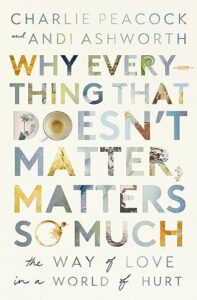
First, I will remind you of a book that I had in our last BookNotes that is now available and which fits nicely into the Square Halo vibe. I refer you to my earlier comments about Why Everything That Doesn’t Matter Matters So Much by Charlie Peacock and Andi Ashworth. Ned and his late wife Leslie are named in the acknowledgments page of this new book (right there near Bono’s name, I like to point out) and Square Halo is listed in a short list of resources in the back, so, truly, this book is a great read for anyone who cares about the sorts of stuff — “How to Live Like a Narnian” as one workshop presenter put it — explored at the Square Halo gathering.
Why Everything That Doesn’t Matter Matters… is warm and kind — the chapters seem to be like letters to us, dear readers — from either Charlie or Andi. Some are indeed about the vocation of being an artist. One is for musicians and music lovers, but an early one gets practical and for us all, called “Why Bother Learning to Cook.” It is written “to those who hunger and thirst for something more.” There is a lovely piece about shelter (for those who “long to love a place and use it well) and a later chapter on being hospitable — “Havens of Grace”, as they put it. Most BookNotes readers, I trust, will really appreciate the wisdom about being a concerned citizen, and another good bit of sanctified common sense about “Talking about Jesus in the Public Square” (which is good for any public speaker or writer, of any kind. Do you blog or Substack or keep a journal, even? You need that chapter.) Lest you think this is mostly about public theology and artful, creative, culture-making there are really practical chapters, too, that just sing with stories and wisdom. There’s stuff about “Knowing When It’s Time to Move” (subtitled: “To Those Considering a Big Change”) and a beautiful chapter (the first I read, actually) for the sick and suffering. There’s a good chapter on marriage, one on parenting (although it is good for any teacher of students — that chapter is called “The Cathedral of God’s Hands”) and there is one called “Soil and Soul” which, like most of the book, is really for “dreamers, beautiful and broken, wonderful and weary.”
 I so wish Andi A. and Charlie P. could have joined their friends at Square Halo in Lancaster: their savvy wisdom about culture-making, artcraft, and public life, and the basic stuff about finding time to write, how to care well in home-making, and otherwise being, as they put it in the first chapter, “on the lookout for redemption,” would have fit right in. Andi was nearly a mentor to Leslie, and a blurb of Charlie’s about the new book of Leslie’s “tiny thoughts” was shown on a screen throughout the event. Whether you know this gang or feel connected to them or not, I sincerely invite you to get this very fine book.
I so wish Andi A. and Charlie P. could have joined their friends at Square Halo in Lancaster: their savvy wisdom about culture-making, artcraft, and public life, and the basic stuff about finding time to write, how to care well in home-making, and otherwise being, as they put it in the first chapter, “on the lookout for redemption,” would have fit right in. Andi was nearly a mentor to Leslie, and a blurb of Charlie’s about the new book of Leslie’s “tiny thoughts” was shown on a screen throughout the event. Whether you know this gang or feel connected to them or not, I sincerely invite you to get this very fine book.
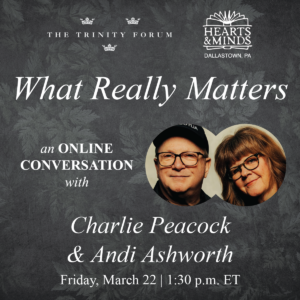 For what it is worth, they’ve been on podcasts and online venues often, but you could check them out at the upcoming Trinity Forum event, Friday, March 22nd, staring at 1:30 EST, which we are co-sponsoring. Please, please, consider sharing this info; Trinity Forum’s Cherie Harder is an excellent host and wise conversation partner making their webinars among the best out there. It’s going to be a really great hour.
For what it is worth, they’ve been on podcasts and online venues often, but you could check them out at the upcoming Trinity Forum event, Friday, March 22nd, staring at 1:30 EST, which we are co-sponsoring. Please, please, consider sharing this info; Trinity Forum’s Cherie Harder is an excellent host and wise conversation partner making their webinars among the best out there. It’s going to be a really great hour.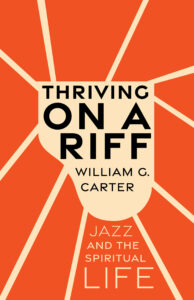 Thriving on a Riff: Jazz and the Spiritual Life William G. Carter (Broadleaf) $26.99
Thriving on a Riff: Jazz and the Spiritual Life William G. Carter (Broadleaf) $26.99OUR SALE PRICE = $21.59
Next, I will commend to you this forthcoming one, one of my very favorite recent reads, a book that is due out in mid-April. You can send us a pre-order now and we will send it as soon as it arrives next month — which you’ll get at our 20% BookNotes discount.
And, this:
“If jazz is spiritual, it does not lift us off the ground, detaching us from the hard realities of life. The music’s spiritual power is a holy animation in the thick of real life.”
Carter is right on, showing that he is reflecting on real life. (As Charlie Peacock, himself a jazz player, puts it, “a new way to be human.”) Carter writes that he is talking about:
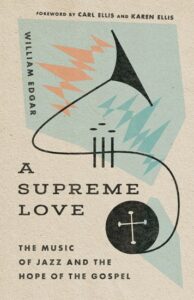 the must-read 2022 release by William Edgar (another Reformed thinker who plays a mean bit of jazz on the keys) A Supreme Love: The Music of Jazz and the Hope of the Gospel, and, say, various theological studies of certain artists and their work, like the vivid book on Coltrane by Jamie Howison called God’s Mind in That Music: Theological Explorations Through the Music of John Coltrane. But Thriving on a Riff is the best I’ve read. It is simply a must for musicians or music fans, and jazz-lovers will surely dig it. A few of the characters and stories may be well known, but most of it was new to me, and really exciting. Even those of us who are not full fans, or who only dabble (or don’t at all!) in the genre, will find it really, really helpful.
the must-read 2022 release by William Edgar (another Reformed thinker who plays a mean bit of jazz on the keys) A Supreme Love: The Music of Jazz and the Hope of the Gospel, and, say, various theological studies of certain artists and their work, like the vivid book on Coltrane by Jamie Howison called God’s Mind in That Music: Theological Explorations Through the Music of John Coltrane. But Thriving on a Riff is the best I’ve read. It is simply a must for musicians or music fans, and jazz-lovers will surely dig it. A few of the characters and stories may be well known, but most of it was new to me, and really exciting. Even those of us who are not full fans, or who only dabble (or don’t at all!) in the genre, will find it really, really helpful.The stories, insightful connections to theological thought and spiritual experience, and unabashed passion of Thriving on a Riff will be memorable music to your soul. Take your time and savor; there is vibrant reflective inspiration here. Moreover, I take personal joy in knowing that this fine, meaningful offering adds more fuel to the fire of a belief I have held for many years: Jazz is the exclamation point to the Resurrection! — Kirk Byron Jones, author of The Jazz of Preaching: How to Preach with Great Freedom and Joy


+++
TO PLACE AN ORDER
PLEASE READ, THEN SCROLL DOWN AND CLICK ON THE “ORDER HERE” LINK BELOW.
It is helpful if you tell us how you want us to ship your orders.And if you are doing a pre-order, tell us if you want us to hold other books until the pre-order comes, or send some now, and others later… we’re eager to serve you in a way that you prefer. Let us know your hopes.
The weight and destination of your package varies but you can use this as a quick, general guide:
There are generally two kinds of US Mail options and, of course, UPS. If necessary, we can do overnight and other expedited methods, too. Just ask.
- United States Postal Service has the option called “Media Mail” which is cheapest but can be a little slower. For one typical book, usually, it’s $4.33; 2 lbs would be $5.07. This is the cheapest method available and seems not to be too delayed.
- United States Postal Service has another, quicker option called “Priority Mail” which is $8.70, if it fits in a flat-rate envelope. Many children’s books and some Bibles are oversized so that might take the next size up which is $9.50. “Priority Mail” gets much more attention than does “Media Mail” and is often just a few days to anywhere in the US.
- UPS Ground is reliable but varies by weight and distance and may take longer than USPS. Sometimes they are cheaper than Priority. We’re happy to figure out your options for you once we know what you want.
If you just want to say “cheapest” that is fine. If you are eager and don’t want the slowest method, do say so. It really helps us serve you well so let us know. Keep in mind the possibility of holiday supply chain issues and slower delivery… still, we’re excited to serve you.
BookNotes
SPECIAL
DISCOUNT
20% OFF
ALL BOOKS MENTIONED
+++
order here
this takes you to the secure Hearts & Minds order form page
just tell us what you want to order
inquire here
if you have questions or need more information
just ask us what you want to know
Hearts & Minds 234 East Main Street Dallastown PA 17313
read@heartsandmindsbooks.com
717-246-3333
Sadly, as of March 2024 we are still closed for in-store browsing. COVID is not fully over. Since few are reporting their illnesses anymore, it is tricky to know the reality but the best measurement is to check the waste water tables to see the amount of virus in the eco-system. It isn’t good. It is important to be aware of how risks we take might effect the public good — those at risk, while not dying from the virus, are experiencing long-term health consequences. (Just check the latest reports of the rise of heart attacks and diabetes among younger adults, caused by long Covid.) It is complicated, but we are still closed for in-store browsing due to our commitment to public health (and the safety of our family who live here, our staff, and customers.) Our store is a bit cramped without top-notch ventilation, so we are trying to be wise. Thanks very much for understanding.
We will keep you posted about our future plans… we are eager to reopen. Pray for us.
We are doing our curb-side and back yard customer service and can show any number of items to you if you call us from our back parking lot. It’s sort of fun, actually. We are eager to serve and grateful for your patience as we all work to mitigate the pandemic. We are very happy to help, so if you are in the area, do stop by. We love to see friends and customers.
We are happy to ship books anywhere.
We are here 10:00 – 6:00 EST / Monday – Saturday. Closed on Sunday.

